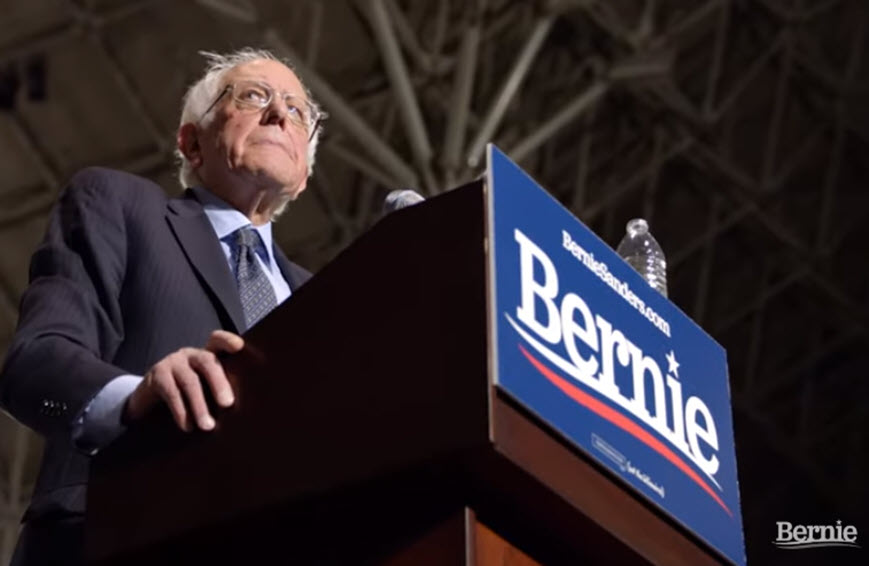Sanders Unveils High-Speed 'Net for All
The smarter way to stay on top of the multichannel video marketplace. Sign up below.
You are now subscribed
Your newsletter sign-up was successful
Presidential candidate Sen. Bernie Sanders (I-Vt.) has unveiled a High-Speed Internet for All plan that would accomplish that, by funding government buildouts, regulating commercial broadband rates and breaking up or regulating "internet monopolies."

Sander's said it would cost $150 billion to provide high-speed access to every household in America, which would come from government subsidized and supplied broadband.
If that were accomplished, there would no longer be any debate on whether, as the FCC must determine in its annual Sec. 706 report to Congress, advanced telecommunications is being deployed to "all Americans" on a reasonable and timely basis.
Related: Sanders Says He Would Break Up Disney, 21st Century Fox
Sanders' plan would "dramatically lower costs," the senator says, by mandating that commercial providers offer basic, "quality" internet at an affordable price. He would also mandate a new definition of high speed at 100 Mbps download, 10 Mbps upload.
"We are going to take on the greedy internet, telecom, and cable monopolies and put an end to their absurd prices gauging," said Sanders. "Just as President Roosevelt fundamentally made America more equal by bringing electricity to every farm and rural community over 80 years ago, as president, I will do the same with high-speed internet.”
That was also the analogy used by former Democratic FCC chairman Tom Wheeler to explain why he felt ISPs needed to be regulated into providing nondiscriminatory universal service.
The smarter way to stay on top of the multichannel video marketplace. Sign up below.
Sanders said under his presidency the internet will be treated like a public utility. That means he will rely on cities and states to build out service.
"Bernie believes it’s time to stop relying on profit-focused corporations to get to universal broadband," his campaign website proclaimed. "Bernie will provide the necessary funding for states, cities, and co-ops to build out their own broadband networks, and ensure all households are connected by the end of his first term."
The plan would:
- "Provide $150 billion through the Green New Deal in infrastructure grants and technical assistance for municipalities and/or states to build publicly owned and democratically controlled, co-operative, or open access broadband networks.
- "Require that all internet service providers offer a Basic Internet Plan that provides quality broadband speeds at an affordable price.
- "Break up internet service provider and cable monopolies, bar service providers from providing content, and unwind anticompetitive mergers.
- "Increase the FCC definition of minimum broadband speeds to 100 mbps for downloads and 10 mbps for uploads.
- "Set aside $7.5 billion to expand high-speed broadband in Indian Country and fully resource the FCC’s Office of Native Affairs and Policy.
- "Ensure people with disabilities have full access to the internet.
- "Guarantee all public housing residents free broadband services.
- "Ensure broadband infrastructure is resilient to the effects of climate change."
According to the latest Morning Consult poll, Sanders is currently in second place in the Democratic primary race with 20% to Joe Biden's 29%.
“We welcome proposals from all presidential candidates to ensure that media-and-technology policies serve the public, not corporate interests," said Free Press Action Policy Manager Dana Floberg. "Senator Sanders’ platform recognizes that the digital divide isn’t just a problem for rural communities, but also for low-income communities and people of color. He proposes promoting competition and lower prices to ensure universally affordable internet access. Free Press Action applauds this commitment to bridging the racial and economic divide that keeps so many of our most vulnerable communities offline, as well as Sanders’ support for investigating the disaster response in Puerto Rico and rebuilding resilient communications infrastructure.
Contributing editor John Eggerton has been an editor and/or writer on media regulation, legislation and policy for over four decades, including covering the FCC, FTC, Congress, the major media trade associations, and the federal courts. In addition to Multichannel News and Broadcasting + Cable, his work has appeared in Radio World, TV Technology, TV Fax, This Week in Consumer Electronics, Variety and the Encyclopedia Britannica.

